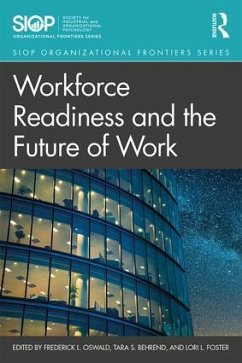
Workforce Readiness and the Future of Work
Versandkostenfrei!
Versandfertig in 1-2 Wochen
167,99 €
inkl. MwSt.

PAYBACK Punkte
84 °P sammeln!
Workforce readiness is an issue that is of great national and societal importance. For the United States and other countries to thrive in a globally interconnected environment of wide-ranging opportunities and threats, the need to develop and maintain a skilled and adaptable workforce is critical. National investments in job training and schools remain essential in stimulating businesses and employment agencies to collaborate productively with educators who provide both training and vocational guidance. Workforce Readiness and the Future of Work argues that the large-scale multifaceted efforts...
Workforce readiness is an issue that is of great national and societal importance. For the United States and other countries to thrive in a globally interconnected environment of wide-ranging opportunities and threats, the need to develop and maintain a skilled and adaptable workforce is critical. National investments in job training and schools remain essential in stimulating businesses and employment agencies to collaborate productively with educators who provide both training and vocational guidance. Workforce Readiness and the Future of Work argues that the large-scale multifaceted efforts required to ensure a reliable and strong supply of talent and skill in the U.S. workforce should be addressed systematically, simultaneously, and systemically across disciplines of thought and levels of analysis. In a four-part framework, the authors cover the major areas of: education in the K-12, vocational, postsecondary, and STEM arenas; economic and labor market considerations; employment, organizations, and the world of work; laws, policies, and budgets at the federal, state, local, and military levels. With contributions from leading scholars, this volume informs high-priority workforce effectiveness issues of current and future concern and concrete research, practice, and policy directions to generate novel insights of a multilevel and system-wide nature.












